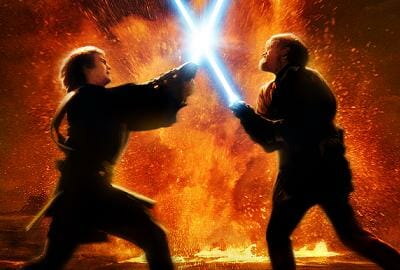
In a couple hours, the madness begins. Revenge of the Sith, the final installment in the Star Wars saga, opens to the public. Actually, the madness has already begun. Multiplexes up and down the East Coast are filled with grown men in robes, brandishing lightsabers at other grown men in full Stormtrooper regalia. Days, weeks, even months prior, a handful of devotees have camped out for tickets—some at theaters that aren’t hosting a premiere.
Unless you’ve holed yourself up in a Montana cabin with no electricity and no access to current print periodicals, you’ve no doubt heard that the reviews of Lucas’ conclusion are mostly positive. But, you ask yourself, what do my trusty sources at Paste think?
For this type of mass-culture, pure-entertainment vehicle, there are two questions that tell the tale.
1) How enjoyable was the supposed amusement?
2) Is it worth repeat viewing?
On the first—and most important—count, Sith scores well. The movie moves along at a pace that holds you, the dialog dials down the cringe factor to a negligible level (it’s far from inspired–the speech is still flat, but at least it’s not endless and flat, as it was in I and II; the love-scenes dialog is utterly devoid of color, emotion and poetry, but its mercifully short compared to Clones; and there little of the eye-roll-inducing lines like C3PO’s “what a drag” from the last one), the plot (which we all know the conclusion of) doesn’t disappoint, and the acting is surprisingly passable. All are refreshing surprises after the mess of the first two prequels. Lucas should get an award for his ability to consistently coax wooden performances out of a talented cast, but this trait is seldom on display here. Hayden Christensen is especially convincing, mostly avoiding the odd combination of over-emoting and stilted deliveries characteristic of his performance in Attack of the Clones. Sure, Lucas benefits from lowered expectations, but he works at some crucial aspects that let the movie work, finally: he minimizes the egregious errors (mostly his use of dialog, pacing and acting) of the first two episodes that interfered with any enjoyment of what actually was there (mostly special effects and a keen visual sense) and adds back the classic space-opera elements that made the original trilogy a success.
On the second count, the movie earns an average grade. I will gladly sit through Sith again with friends, and I hope to. But I’m not especially anxious to do so. There are few plot points, pieces of dialog, special effects or emotional nuances I hope to discover on a subsequent viewing. More importantly, I’m not emotionally invested in the characters enough to hunger to take the journey with them again, at least not right away.
It’s true that this is the strongest of the prequels, but that’s obviously faint praise. Still, it’s probably stronger than the film that started it all (ignoring the credit it deserves for its wow factor in 1977), and possibly than Return of the Jedi. But the second point—its failure to demand repeated viewings—illustrates its inferiority to The Empire Strikes Back. Empire benefited from a better director, script and execution. Three factors stand out as key to its dominance over Sith.
1) Sith is hampered by Lucas’ earlier failed attempts. Episodes One and Two failed to deliver a cohesive cast of characters that we care about; whatever feelings we can conjure toward them are largely stolen from feelings we have for the generation to come. Sith is in the unfortunate position of inheriting this flaw, but it does as well as it can with what it’s given.
2) All of the prequels, including this one, have lacked the humor of the originals—not that the humor was hugely successful (it was average, at best, and mostly due to Harrison Ford). The levity wasn’t so much valuable in itself, but served as a humanizing factor for its characters and as a pacing device. Phantom Menace and Clones collapsed under their own weight. Sith more or less fixes the pacing problem, but could still use the humanizing factor (though it would have been hard to work in at this point).
3) Revenge of the Sith lacks the ambiguity and suspense of The Empire Strikes Back. As oft reported, both are dark, but with Empire, there was real danger and suspense. That team had the guts to not tidy every thing up by film’s end, and you’re left with the feeling that the Dark Side is indeed powerful, perhaps more powerful. Now, of course, we know the rest of the story. It’s an issue inherent in the way Lucas chose to tell the six chapters of the story, and to be expected. Though not really a flaw in Lucas’ direction, it robs Sith of some of its punch and will inevitably lessen the passion that people otherwise would have felt for it.
Nevertheless, Lucas deserves kudos for going out on a satisfactory note. Despite our knowing where the story goes, Sith keeps your attention through its 140-plus minutes. And that says something about Lucas’s skill and the power of the universe he created.